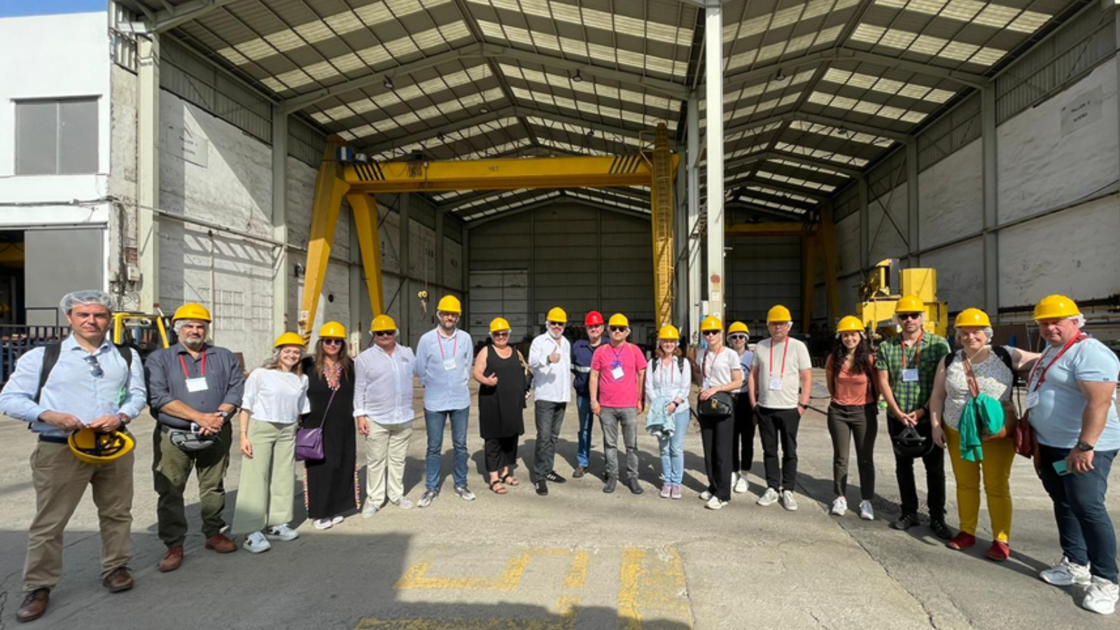IndustriAll Europe and the European Transport Workers’ Federation (ETF) organised the third workshop on the maritime sector on 15 June in Bilbao. The programme examined the health, safety and skills challenges of the green transition for workers in maritime industries and services.
The workshop was part of a joint EU project ‘Building a Just Transition towards a Smart and Sustainable Mobility’ (JT4 Mobility), which aims to create a better understanding of a Just Transition for manufacturing and transport workers.
Workers are at the heart of the green industrial transition in Europe’s maritime sectors and the main takeaways from last week’s discussions were the need for health and safety measures in the context of new renewable fuels and the need for upskilling and reskilling.
The importance of the sector and the topic also attracted the Basque Government’s Ministry of Industry, which acknowledged that the maritime industries are a basic and strategic pillar of the European industrial market. Speaking at the event, the Deputy Regional Minister of Industry, Mikel Amundarain Leibar, reported that the government’s strategy is to focus on green jobs in maritime mobility.
The first panel addressed the social standards and safety issues that are increasing with the transitions the sectors are experiencing. The use of new fuels does not go hand in hand with the development of new health and safety measures for workers. In addition to the technical challenges, the green transition also exacerbates social challenges, as workers in the waterborne sector are more vulnerable to social dumping.
External speakers underlined the need for standard training, social protection measures for workers, and new measures of health and safety for transport and manufacturing workers.
A second panel focused on the skills needed in the waterborne industry due to the twin transition. Participants agreed on the importance of a clear strategy for upskilling and reskilling workers, to keep quality jobs. The digital transition will transform, create, and eliminate jobs; skills should be the starting point to tackle this transformation. Vocational education and training (VET) must be used as a tool. IndustriAll Europe and ETF stressed the need to find sustainable solutions to address the current skills shortages, while also ensuring a safe and just transition.
The three maritime workshops organised over the last twelve months have highlighted common challenges for manufacturing and transport workers: skills shortages exacerbated by the transition, lack of anticipation and lack of adequate social protection measures. These must be tackled at European level and industriAll Europe and ETF are jointly calling for a clear EU industrial policy framework that promotes fair jobs and social conditionality through the lens of a Just Transition.
Judith Kirton-Darling, Deputy General Secretary of industriAll Europe, said:
“We demand a Just Transition for all workers of the waterborne industries, not just rhetoric. To make this happen, the participation of workers and their unions in the anticipation and social management of change in the maritime industries is an absolute prerequisite. At present, attention to the social aspects of the transition is still lacking and there is a massive need for investment in upskilling and reskilling of workers to leave no one behind.”
Nikolaos Koletsis, ETF policy officer for Maritime Transport:
“Workers are at the heart of the green transition and they insist on a socially responsible transition. We expect a very interesting and fruitful discussion on the recognition of new skills, new risks associated with the transition and best practices on how workers can access training and reskilling to be prepared for the energy transition.”
A site visit of the Zamakona shipyard in Santurtzi at the end of the workshop allowed participants to see practical examples of what they had discussed earlier and to meet the local human resources manager.
